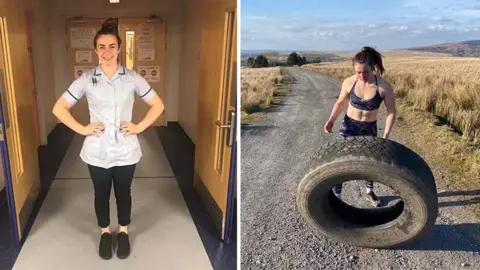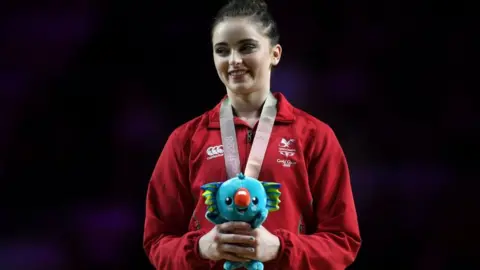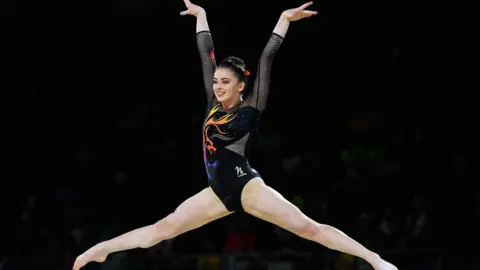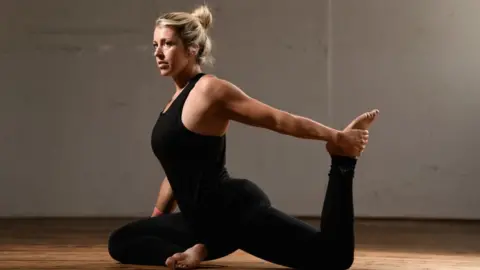Covid: Many female athletes 'may walk away' after pandemic
Increasing numbers of top female athletes will walk away from their sport due to difficulties during the pandemic, leading figures have warned.
Gymnast Latalia Bevan, 20, and rugby international Angharad de Smet, 24, say Covid has left their careers in the balance.
Sports sociologist Dr Ali Bowes said it had highlighted inequalities in sport.
"There are absolutely concerns women will walk away," she said.
Wales rugby international de Smet, who has worked on the front line during the pandemic, said she's been left wondering whether "the love of the game is enough?"
The 24-year-old from Ammanford, who was playing for Wales in the Autumn Internationals and as part of the sevens squad before Covid-19, was "living the life of a professional athlete, without the pay cheque".
But as Wales began its first lockdown, games and training were cancelled.
 Angharad de Smet
Angharad de SmetOver the last year, she said she's trained with just one kettlebell, unable to access proper equipment or facilities. Her last game of rugby was 14 months ago.
The physiotherapist technician, who works on an elderly care ward in Swansea, said she has struggled to train after gruelling shifts in hospital.
"You've seen things you would hope to never see again in your lifetime, to come home and try and do a gym session... in your tiny kitchen... you think 'why am I bothering?'"
In 2019, the 24-year-old had been travelling to Worcester to train a couple of times a week after work, arriving home in the early hours.
"Nobody understands how much we give, just the wear and tear on your car, the petrol, putting food on the table, trying to get good food into you to aid recovery is expensive."
Now, she describes her future in the sport as "uncertain".
"Do I put my career first or do I pursue my dream of playing internationally, becoming a professional athlete? I am 24, should I have to make those sorts of calls already?"
Commonwealth Games silver medallist Latalia Bevan said the challenges of a global pandemic were a "massive" factor in her decision to retire from elite gymnastics earlier this year.
 YE AUNG THU/Getty Images
YE AUNG THU/Getty Images "It was so hard to keep your motivation, we'd do two or three Zooms a day, so my home turned into a gym and I'm from a family of seven."
The 20-year-old from Merthyr Tydfil, who won Wales' first gymnastics medal at the Gold Coast 2018 Games in Australia, had been training for 32 hours a week as well as studying at university in Cardiff.
As a student, she used her loan to help cover costs after losing GB funding and while recovering from an operation.
But after leaving her studies, she lost the financial support and struggled to adjust to a new life away from the gym after 14 years.
She's been working as a home carer since retiring and said it's nice not to have to rely on her family to pay for things.
 Dan Mullan/Getty
Dan Mullan/Getty The former gymnast said she'd thought about returning to the sport but, if she did, she'd have to quit her job and that isn't an option with rent to pay.
She's now focused on becoming a gymnastics coach and personal trainer.
 Stu Forster/Getty Images
Stu Forster/Getty ImagesRugby player Alecs Donovan "would never have thought" that at the end of the third lockdown she'd retire.
With her yoga businesses closed, the 30-year-old said she was able to train "more than ever".
The business owner said the pandemic has given her the chance to sit back and prioritise seeing family and friends.
As a personal trainer who works with professional male athletes, she said it can be worse seeing their schedules and the support they get.
She added she was aware of women who don't go for promotions because their current job allows them to play the sport, but she wonders what will happen when rugby stops.
Equality 'on the agenda'
Dr Ali Bowes, senior lecturer in sociology of sport at Nottingham Trent University, said: "It's one year on from lockdown and it's really obvious where the inequalities exist."
Her research, looking at the impact of the Covid-19 pandemic on elite women's sport, found women struggled to access equipment, a gender "play" gap where men's sport returned faster and financial difficulties for women who were unable to play.
"There are absolutely concerns that women will walk away and we've seen that already with some examples in a number of sports where it's been too difficult for them to continue," she said.
The sociologist is optimistic that discussions about the problems in women's sport, and the difficulties athletes face can be used for positive change.
"There's also been significant forward steps, and it's put equality really on the agenda for lots of sports organisations, teams, clubs and national governing bodies. There's no hiding place now."


